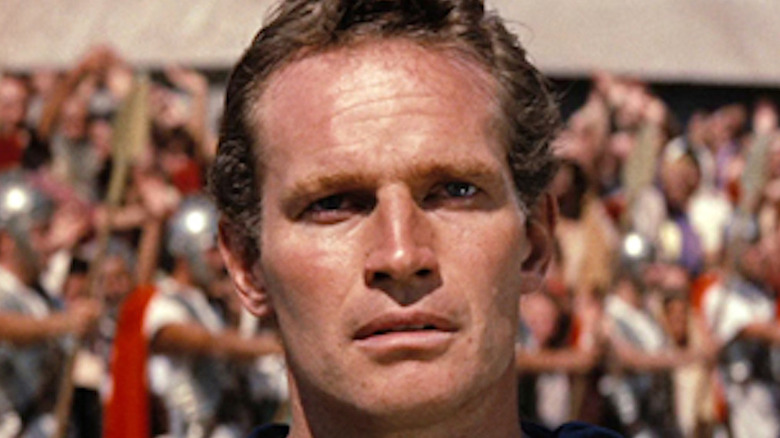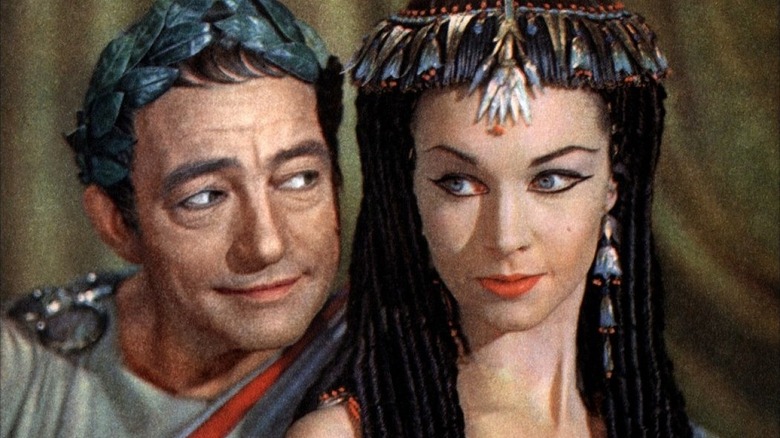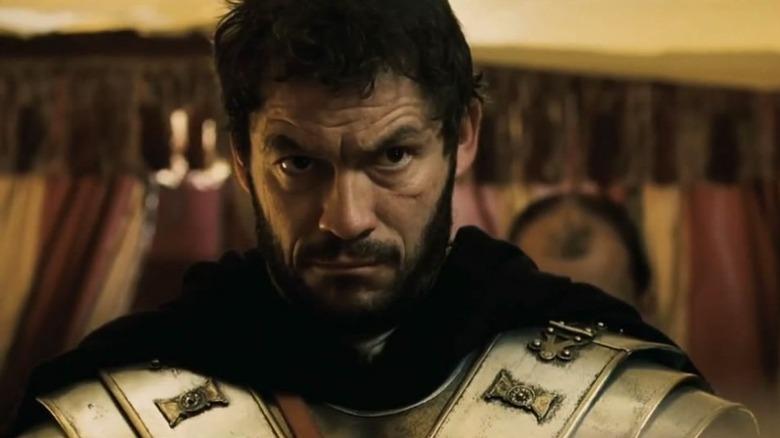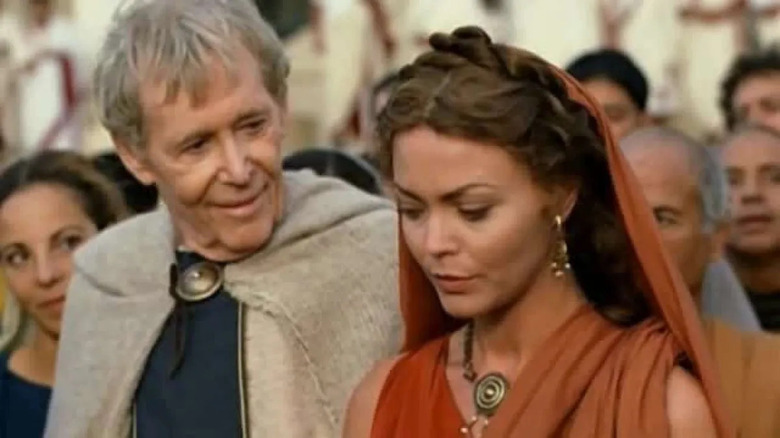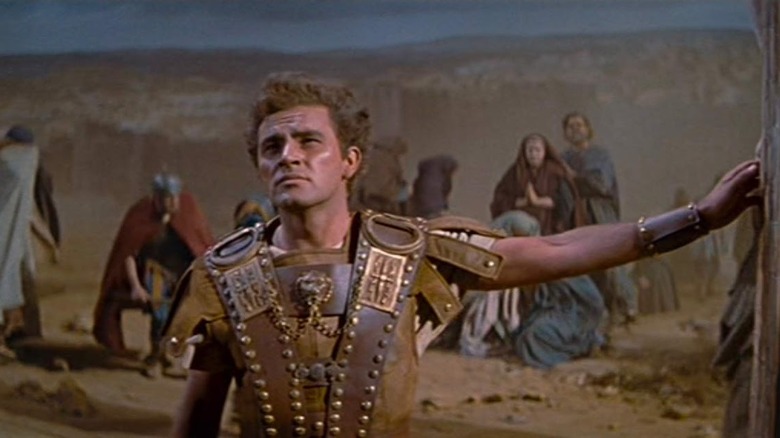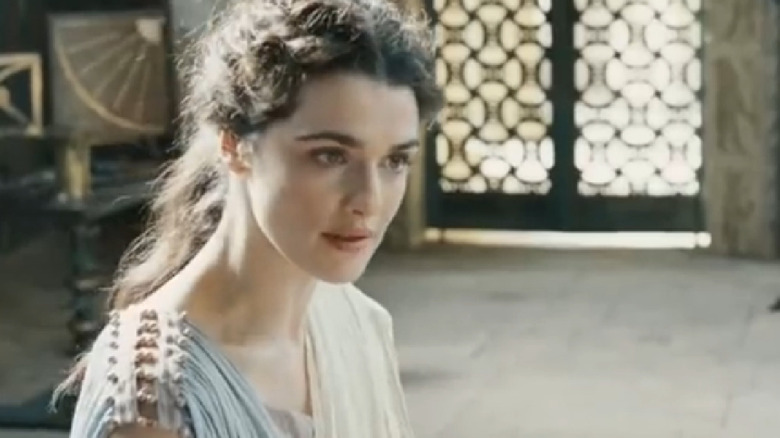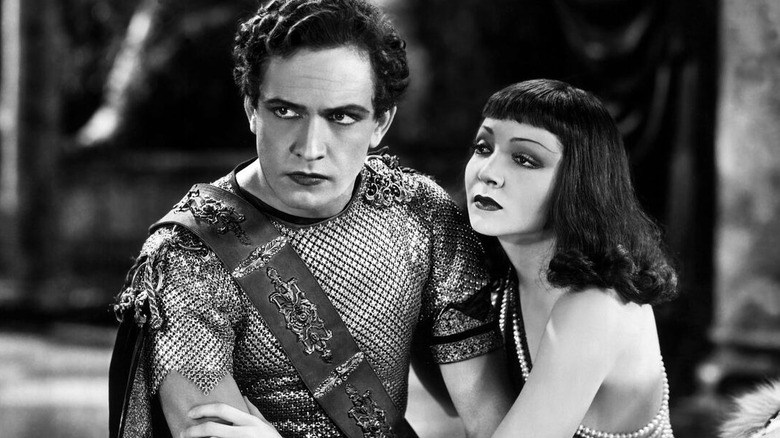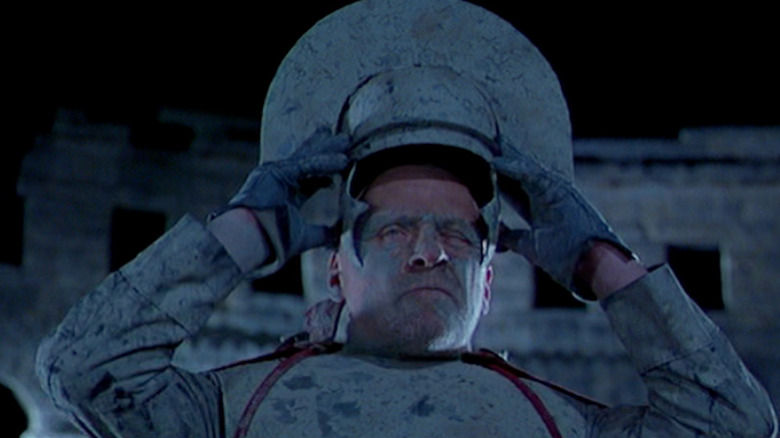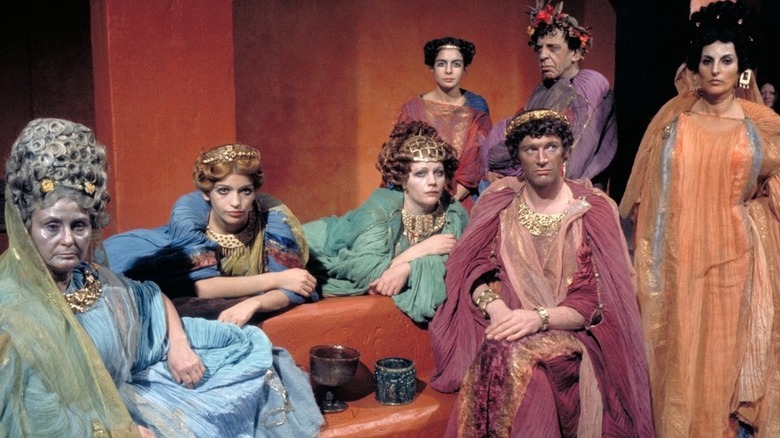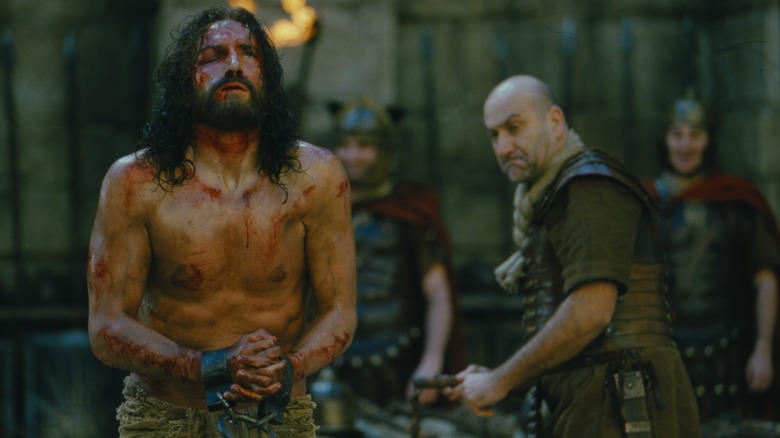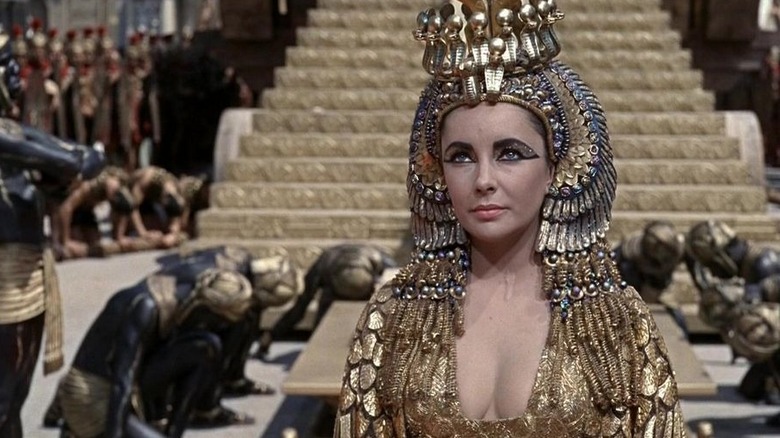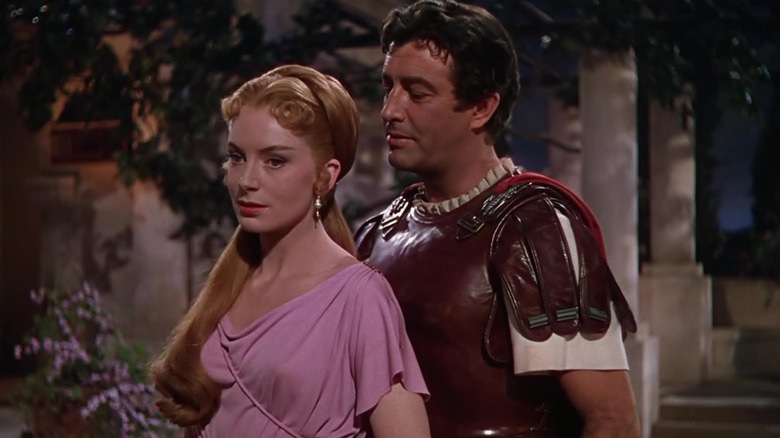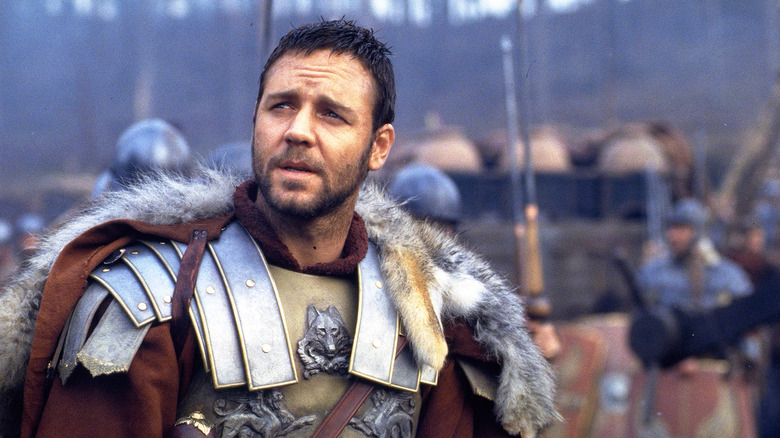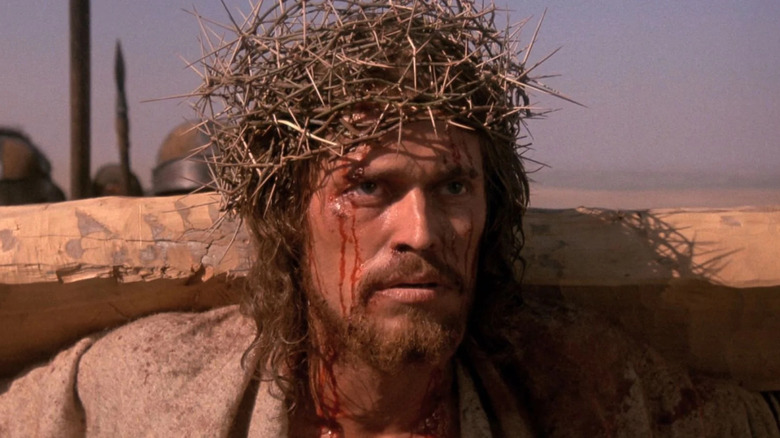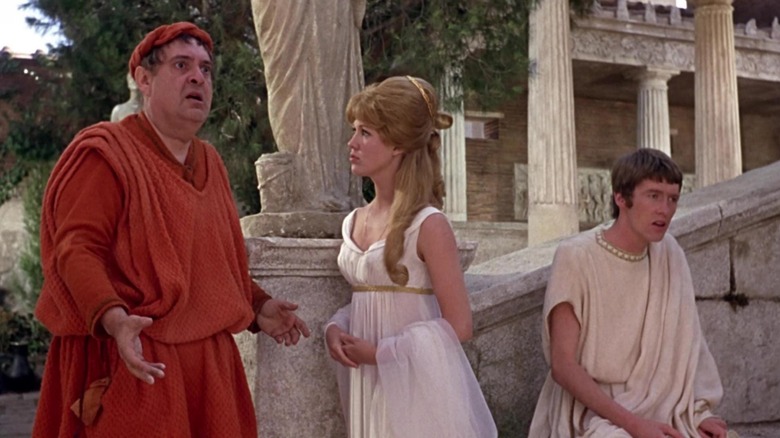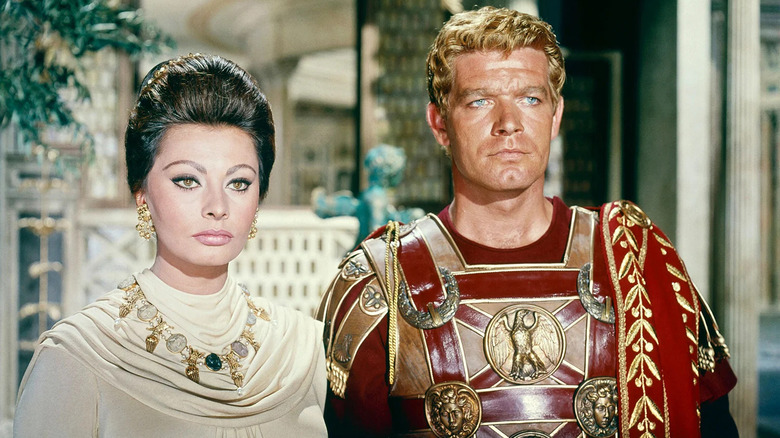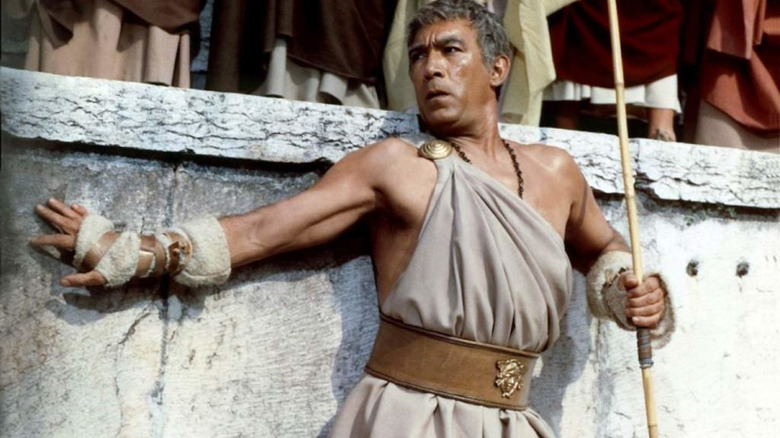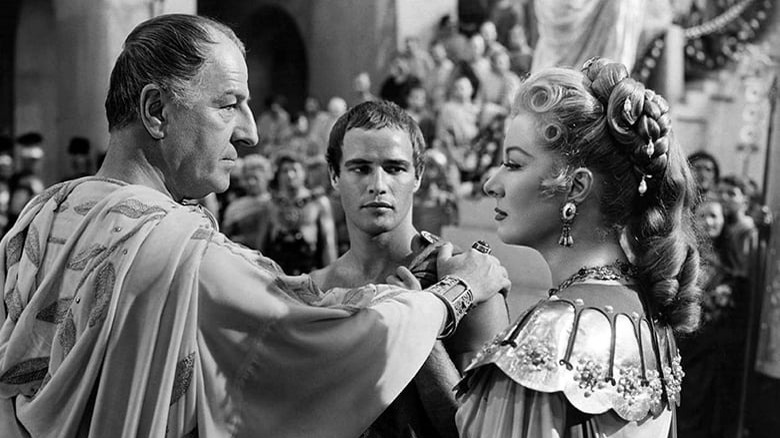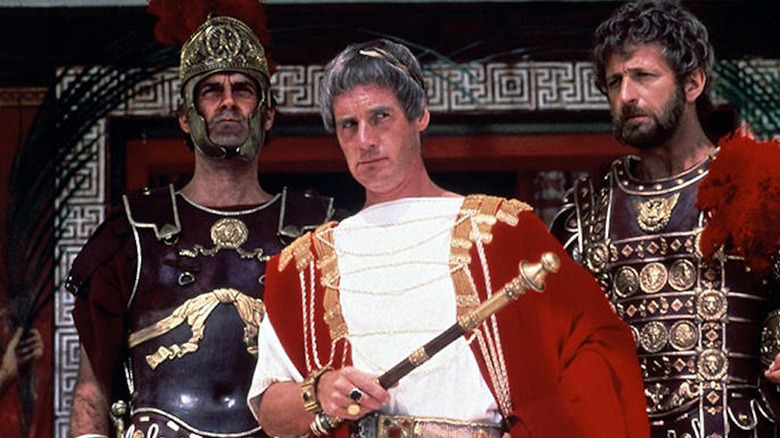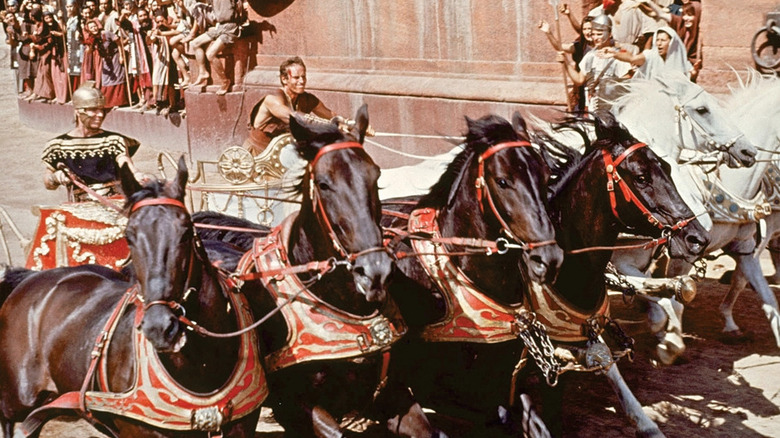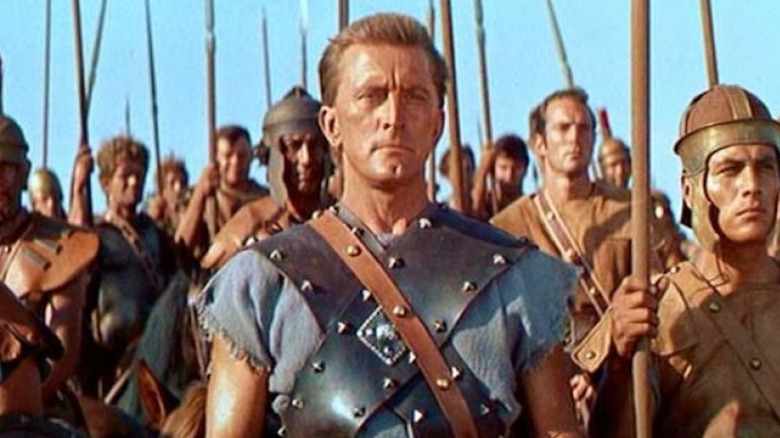20 Best Movies About The Roman Empire For History Lovers
Some of the earliest films in cinematic history have been grand epics, many set during the height of the Roman Empire. A time that has long fascinated us for its excitement, this era was rife with war, adventure, scandal, and political intrigue. It was also a heavily documented point in history, leaving scholars with contemporary accounts of some of the empires' most fascinating events, from government corruption to military campaigns and assassination plots. As a result, pop culture is also gifted with a great number of compelling real-life figures to draw upon for dramatic retellings.
Ancient Rome also happens to be the setting for the greatest religious stories, as Jesus Christ was born and killed during the reign of the Caesars. As the group that sent Jesus of Nazareth to crucifixion and blamed Christians for the burning of Rome, the ancient Romans became the greatest villains in history, and the antagonists in the most widely read book in history. From the swift rise of the Roman Empire to its devastating fall, there are countless dramatic stories to be told, and Hollywood has chronicled many of them across several genres, including action-adventures, dramatic personal journeys, light-hearted comedies, and, of course, sweeping epics. Here's a look at the 20 best movies set in the Roman Empire, ranked. Will Judah Ben-Hur, Jesus Christ, or Spartacus come out on top? Read on to find out.
20. Caesar and Cleopatra
Historical epics set in ancient Rome were popular in the early days of cinema, and as the industry evolved, productions got bigger and bigger. One of the early color films set in the period is "Caesar and Cleopatra," starring two of Tinseltown's biggest stars at the time in Claude Rains and Vivien Leigh. According to some accounts, the film was one of the biggest movies ever produced in England at the time, with massive, jaw-dropping sets that included a specially constructed replica of the Sphinx, while the Egyptian government reportedly called in thousands of troops to take part in the expansive battle scenes.
The film chronicles a latter-day version of Roman emperor Julius Caesar (Rains) as he hopes to ease tensions with neighboring young Egyptian queen Cleopatra (Leigh). The newly-installed beauty is dealing with troubles internally however as she and her brother Ptolemy — who she has awkwardly married by custom — fight for control of their kingdom and are resentful to be forced to rule side by side. Caesar becomes a mentor to the young queen, advising her on how to be an effective politician, sway public affairs to her own benefit, and exert control over her brother.
A lavish production, "Caesar and Cleopatra" explores the complicated relationship between the two ruling ancient monarchs, and received strong reviews for its star performers and somewhat more philosophical look at the politics of ancient Rome and Egypt.
19. Centurion
The 2010 action drama "Centurion" is inspired by the story of Legio IX Hispana, a Roman legion that disappeared in Caledonia in the 2nd century CE. Though historical records give no explanation, the film fictionalizes what really happened, providing a fascinating possibility to account for one of Rome's greatest unexplained events. The movie stars Dominic West ("The Wire") as Titus Flavius Virilus, the legion's commander, and Michael Fassbender ("X-Men: First Class") as one of his soldiers, Quintus Dias. Olga Kurylenko ("Black Widow") also stars as Etain, a Celtic Brigantian warrior who guides the Roman regiment through the Scottish Highlands on a quest to eliminate the leader of the Picts, a tribe who has successfully fought off the Roman Empire at every turn.
But when Etain betrays the legion — revealing that her entire family had been murdered at the hands of cold-blooded Romans — most of the soldiers are slaughtered, and Virilus is captured and taken to Pict King Gorlacon (Ulrich Thomsen), who has his own score to settle. Now Dias and the surviving legionnaires must race back to their own territory, pursued by a group of Pict warriors led by Etain, who seek vengeance for the killing of King Gorlacon's son. But Roman leaders fear that their rivals might be emboldened if they learn of Virilus' defeat, and may not welcome Dias home with open arms.
This action-packed film offers an interesting theory on an ancient mystery from history.
18. Augustus: The First Emperor
One of a series of multi-part television films in the early 2000s exploring many of Rome's greatest leaders, "Augustus: The First Emperor" was a three-hour epic film that included a few big names in its cast, such as Peter O'Toole and Charlotte Rampling. Mostly told in flashback, the movie picks up late in the life of Augustus Caesar (O'Toole), as the aging Roman ruler recounts the events of his life to his daughter Julia (Vittoria Belvedere), following the unexpected death of her husband, Marcus Agrippa (Ken Duken).
We then see Augustus' earlier days as he allies himself with Marc Antony in the wake of Julius Caesar's death. While Caesar's murder leads to chaos in the kingdom, with Brutus and his cohorts executed and a spate of callous executions sweeping through the city, Augustus and Antony consolidate their power and reorganize the Roman political structure, with Antony leaving to take control of Egypt. But when Antony becomes the lover of Egypt's queen Cleopatra, he turns his back on Augustus and declares war on Rome. After conquering Egypt, repeated scandals rock Augustus' court, all culminating in the expulsion of his daughter Julia, who is ultimately exiled for adultery and treason.
Though it takes some creative liberties with the historical accounts, the film is a solid mix of Roman adventure and soap opera drama, not unlike BBC's classic "I, Claudius."
17. The Robe
Several films on this list focus on the life and death of Jesus of Nazareth, but 1953 film "The Robe" is unique in that it focuses on the Roman legion responsible for carrying out his execution. Richard Burton ("The Spy Who Came In From The Cold") stars in the pic as Marcellus Gallio, a Roman soldier banished from the kingdom and sent to Jerusalem by Caligula (Jay Robinson). Hoping to earn his way back into Rome's good graces, Marcellus calls in favors and is given a task by Emperor Tiberius to oversee the crucifixion of the proclaimed messiah, who history would eventually come to know as Jesus Christ. Marcellus and his right-hand man — the loyal Greek slave Demetrius — soon become converts to Jesus' teachings and begin to question their role in Rome's quest to quell his rise.
Though criticized by some as "overblown melodramatic biblical nonsense," the film is a fascinating look at the religious icon from the Roman perspective, even if it is an overly fictionalized, Hollywood idealization of what might have occurred. "The Robe" also has the distinction of being the first film released in widescreen Cinemascope, helping it become a hit on its release. Thanks to a successful box office take, a sequel was even produced a year later titled "Demetrius And The Gladiators," which moved the focus to Demetrius and his army, removed much of the Biblical context, and delved further into Roman politics.
16. Agora
Before he was a household name, "Moon Knight" star Oscar Isaac appeared in the 2009 drama "Agora" opposite Rachel Weisz ("Black Widow"), set in ancient Rome in the 4th century BC. In the film, Weisz portrays philosopher, astronomer, and intellectual Hypatia, who resided in Alexandria, Egypt, which was then part of the Roman Empire. Isaac plays her student, and later ruler of Alexandria, Orestes. During a time of great upheaval in the Roman Empire, Hypatia works to poke holes in the prevailing belief in the Ptolemaic system that posits that the Earth is the center of the universe. Her investigations lead her to challenge the system and reasoned that the Earth may be a sphere — a shocking upending of established doctrine that results in accusations of heresy.
While social and political shifts sweep the region, including the rise of Christianity, her student Orestes is elevated to prefect. Still enamored and in love with his former mentor who has now been labeled a heretic, their relationship and her scientific theories begin to cause problems for them both, imperiling the fate of Alexandria itself. As the city is threatened, Hypatia must go beyond her mere duties as a scientist and fight to preserve ancient knowledge from being destroyed as religious fanatics attempt to take the city.
Though the film oversimplifies some elements, it was given good marks for historical accuracy, and it tells an otherwise overlooked part of Roman history and one if its most fascinating figures.
15. The Sign of the Cross
"The Sign of the Cross" is an early cinematic epic that predates the Hollywood Hays Code and comes from two of the biggest names of their time: director Cecil B. DeMille and actor Fredric March. DeMille, of course, already did a number of religious epics, including "King Of Kings" and "The Ten Commandments," while March had already won an Academy Award for his performance in "Dr. Jekyll And Mr. Hyde" just a year before this one. The film, set during Nero's reign as emperor, chronicles the empire's fall and how he scapegoated Christians for its destruction. But Roman prefect Marcus Superbus defies the emperor by showing mercy to the emerging religious sect.
Desperate to project strength and hide his failures, Nero has Christians arrested for the burning of Rome. His forces clash with Marcus, who wants to be seen as a benevolent prefect in the hopes of attracting the young and beautiful Mercia (Elissa Landi), whose father has been persecuted for his Christian faith. But when Empress Poppaea (Claudette Colbert) learns of Marcus' attempt to woo Mercia, she looks to have her sentenced to death so she can have Superbus to herself. Amid the turmoil of religious persecution, Marcus and Mercia must fight for true love.
An old Hollywood classic, "The Sign of the Cross" was the subject of pre-code censorship due to several risqué scenes including nudity and erotic elements that would be viewed as rather tame today. However, it is now widely considered one of the most significant historical films of all time.
14. Titus
Based on William Shakespeare's tragedy "Titus Andronicus," the 1999 film "Titus" is unique among this list of movies set in ancient Rome, as its the only one you'll find characters wearing three piece suits and speaking into electric microphones. Set in an imaginary fantasy world that mixes elements from different time periods, "Titus" stars Anthony Hopkins, Alan Cumming, and Jessica Lange, and was directed by Julie Taymor (Broadway's "The Lion King"). The film follows the titular Roman general Titus Andronicus (Hopkins), who is forced to kill the son of his greatest rival, Goth leader Tamora (Lange). The Goth queen begs him to reconsider but is rebuffed, and she sets out to get her revenge on the vicious and cruel Titus, sparking a bitter and bloody war between their families and empires.
An unrelenting, violent film that borders on a slasher flick with heaping amounts of Hollywood gore, "Titus" is a brutal Shakespearean tragedy in every sense, amped up for the big screen. And like another anachronistic take on a Shakespearean classics — 1996's "Romeo + Juliet" — "Titus" deftly mixes disparate elements to create something truly unique and special, with a dreamlike tone all its own. Don't expect to find anyone to root for, though, as "Titus" provides no such heroes; instead, it offers a simple revenge story between despicable characters, resulting in a beautiful and lyrical rampage in blood.
13. Fellini Satyricon
Loosely based on the contemporary Roman fiction work "Satyricon" written by Gaius Petronius in the late first century AD, "Fellini Satyricon" is so named for its writer and director Federico Fellini. The Italian film is a true work of art, a stunning masterpiece of visual storytelling, full of striking sets, vivid colors, and intense performances. It tells the story of Encolpio (Martin Potter), left alone and heartbroken when his lover Gitón (Max Born) leaves him for another man. Though he is distraught, disaster strikes Rome during Nero's time as emperor, and, while drifting from place to place in the aftermath, Encolpio finds himself on a journey of self discovery and encounters a number of unusual scenes on his way to enlightenment. Encolpio visits a bizarre theater production, is taken prisoner by pirates, escapes marauding soldiers, and gets lost in a labyrinth.
A controversial film, it's full of scandalous subject matter and unsettling imagery, becoming a nearly avant-garde film — something to be expected if you're familiar with Fellini, who made a career mixing fantasy and reality. But as an insight into the creative work generated by ancient Roman authors and of '60s cinema, too, it's one movie not to be missed by film buffs and lovers of Roman history alike.
12. The Passion of the Christ
Mel Gibson's third directorial effort — and his first in nearly a decade since "Braveheart" in 1995 — "The Passion of the Christ" is the first film he helmed but did not star in. Instead, actor Jim Caviezel ("Frequency") took on the role of Jesus Christ, the persecuted Jewish preacher who sought to impart a new philosophy to the people. Sentenced to a gruesome death by crucifixion by the Roman Empire, the film follows the final day before his death, dramatizing several key moments depicted in the Bible. This includes portraying biblical events such as the Agony in the Garden and the Scourging at the Pillar. In its graphic depiction of events, we also see Jesus recalling the Last Supper, the betrayal of Judas, and the Sermon on the Mount.
A blockbuster at the box office, "The Passion of the Christ" set a number of records at the ticket counter. Lauded for its realistic portrayal of the Biblical narrative, it shows Jesus as a humble man willing to suffer for what he believes to be the greater good. But be warned, "The Passion of the Christ" is an emotional gut-punch, and not the feel-good, inspirational movie one might expect (as the New York Times' review put it, the film "is so relentlessly focused on the savagery of Jesus' final hours that this film seems to arise less from love than from wrath, and to succeed more in assaulting the spirit than in uplifting it"). So, prepare for some brutality with this pic.
11. Cleopatra
Perhaps the most beloved film to chronicle the life of the Egyptian queen, the 1963 film "Cleopatra" features a parade of classic Hollywood all-stars. Hollywood royalty Elizabeth Taylor filled the title role, while the cast was brimming with other big names like Richard Burton, Rex Harrison, Hume Cronyn, Roddy McDowall, and Martin Landau. Like many other epics on this list, it was a major studio undertaking with massive sets and elaborate costumes, with a budget so sky high that it was a flop despite drawing crowds, effectively ending big-budget blockbusters for years.
Still, the budget was used to good effect, and the movie is an extravagant retelling of the life of the famous Egyptian beauty as she struggled to resist pressure from Rome. Drawn into a love triangle, as both Julius Caesar and Marc Antony vied for her affections while slyly attempting a takeover of her kingdom, Cleopatra had to fend off advances both personal and political. The film is a fascinating watch for more reasons than one, and an added layer of intrigue comes from the notorious affair between Taylor and Burton that was sparked during production.
Ultimately though, Cleopatra is all about what's on screen, a gorgeously produced — if not entirely accurate — dramatic retelling of the ancient world's most famous woman. After its release, it was nominated for nine Academy Awards, including Best Picture, and took home four trophies in technical categories for art direction, costuming, visual effects, and cinematography.
10. Quo Vadis
Another Roman epic set during the final years of Emperor Nero's reign, "Quo Vadis" is a 1951 film starring Robert Taylor, Deborah Kerr, and Peter Ustinov. The film centers on Roman military commander named Marcus Vinicius, the legate of the XIV Gemina. Following an extended campaign in Gaul, Vinicius journeys back to Rome to discover that Christianity is quickly sweeping through the empire and threatens to become the dominant religion. On his return, he meets and falls in love with Lygia, who has been taken in by the fledgling faith. As he courts Lygia, who is apprehensive due to their clashing beliefs, the emperor begins to crack down on the Christians he has scapegoated for the destruction of Rome.
Once again, we see Nero ordering arrests and executions, while political turmoil grips his own court within as Poppaea — the emperor's wife — plots to kill Lygia over Marcus rejecting her. Now with a personal stake, Marcus must save his lover and expose Nero as the leader that doomed Rome. Nominated for eight Academy Awards, "Quo Vadis" was a hit at the box office and popular with critics, who gave it high marks for its strong cast, expansive scope, and the opulence of its production.
9. Gladiator
Sweeping Roman epics weren't seen as a blockbuster fare by the 1990s, but all that changed as the calendar rolled over to the new millennium. Acclaimed director Ridley Scott ("Alien") took the helm of a dramatic Roman adventure, starring emerging Aussie star Russell Crowe, and delivered audiences an action-adventure set at the height of the Roman Empire. "Gladiator" proved to be a barn burner as one of the biggest movies of the year.
The film tells the story of Roman General Maximus Decimus Meridius (Crowe), who is anointed heir to the empire just before the emperor's wayward son Commodus (Joaquin Phoenix) rebels and seizes the throne. Forcing Maximus to become a slave, the disgraced general fights for his life in the gladiatorial arena. As the situation in Rome deteriorates, though, Maximus sparks an uprising and leads a massive slave revolt to depose Commodus.
Sadly, co-star Oliver Reed, who played Maximus' mentor, didn't live to complete his role, with some of his scenes having to be finished using CGI. Also starring Connie Nielsen, Derek Jacobi, and Djimon Hounsou, the movie became the second-highest grossing film of the year and won the Academy Award for Best Picture, also netting Russell Crowe his first Oscar for Best Actor. It even ignited a resurgence of the "sword-and-sandal" genre, with movies like "Troy" and "Kingdom Of Heaven" and TV shows like "Rome" and "Spartacus" following in its seismic wake.
8. The Last Temptation of Christ
Directed by acclaimed filmmaker Martin Scorsese ("Taxi Driver"), "The Last Temptation of Christ" was released in 1988 and starred Willem Dafoe, Harvey Keitel, Barbara Hershey, and David Bowie as Pontius Pilate. The groundbreaking biblical epic wasn't just a triumph of cinema, it was a controversial film whose release led to widespread protests, death threats, national bans, and even violence. Accused of sacrilege, the film dramatically retold the life and death of Jesus Christ much like "Passion of the Christ," but it greatly departed from the biblical narrative to give the story a more balanced tone. Many religious organizations felt the movie was blasphemous thanks to a scene of romance involving Jesus and Mary Magdalene, along with depictions of Christ as a doubting man who suffered not just for mankind's sins but from inner turmoil, anger, and lust, eventually renouncing his place as the son of God.
However one might feel about historical accuracy or its faithfulness to the Christian gospel, there's no doubting its quality as a deep and dramatic exploration of the man and his struggle to follow his faith in grand design. As loved as it was by some audiences and reviewers, and as much as it was reviled by its worst critics, the film netted Scorsese an Academy Award nomination for Best Director.
7. A Funny Thing Happened on the Way to the Forum
Directed by Richard Lester (who would go on to replace Richard Donner for "Superman II"), the 1966 historical musical comedy "A Funny Thing Happened on the Way to the Forum" was adapted from the five-time Tony Award-winning Broadway play of the same name, with music and lyrics by the renowned Steven Sondheim. Zero Mostel, who won the Tony for Best Actor in a Leading Role, along with his original co-star Jack Gilford, returned to reprise their roles from the stage. They were also joined by stars Phil Silvers, Roy Kinnear, Jon Pertwee, and Buster Keaton in his final theatrical film role before his death. An homage to classical Roman farces, the movie (like the play) focuses on a slovenly Roman slave named Pseudolus (Mostel), who dreams of freedom.
When Pseudolus learns that his master's son has fallen hopelessly in love with the seemingly unattainable Philia from the nearby house of Marcus Lycus, he strikes a bargain: he will help his master's son win Philia's heart and in exchange he'll be granted his freedom from bondage. What follows is a madcap slapstick romp set against the backdrop of the ancient Roman Empire, and a delightful comedy that carried over many of the musical numbers from the play. Popular with critics and audiences, its success helped to inspire the British TV series "Up, Pompeii!" just a few years later.
6. The Fall Of The Roman Empire
Another old Hollywood epic, "The Fall of the Roman Empire" does not depict the final end of the ancient empire, instead chronicling the developments that would ultimately lead to its downfall in the centuries to follow: corruption, decadence, imperial hubris, and territorial over-expansion. The film also has one of the most impressive casts of any film on this list, with Stephen Boyd and Sophia Loren leading a marquee that also features Alec Guinness, James Mason, Christopher Plummer, and Omar Sharif. Like Ridley Scott's "Gladiator" that tells a similar story, the film once again opens with progressive Emperor Marcus Aurelius (Guinness) struggling to find a successor to the throne. After discounting his more tyrannical son Commodus, he leans towards picking Livius, a respected soldier and lover to his daughter Lucilla (Loren).
However, when Aurelius is poisoned before he can put his plans in place, his son Commodus takes the throne instead and proceeds to retract all of the liberal policies his father had put in place. With the new emperor seeking to enrich himself and his friends at the expense of the people, Livius soon sees how Commodus' corruption and depravity could be the start of the empire's end, even if he is loyalty-bound to support him. Things then change when Commodus plots to assassinate his sister, forcing Livius to step up and oppose the corrupt Roman ruler.
"The Fall of the Roman Empire" received high marks from critics and even inspired a novelization.
5. Barabbas
Anthony Quinn, Arthur Kennedy, and Jack Palance star in the 1961 film "Barabbas," focusing on the eponymous Roman criminal (Quinn), who appears in some biblical and historical accounts. An unrepentant sinner, Barabbas — who many believe to be a real figure who appears in some historical accounts — is sentenced to death by the empire alongside Jesus of Nazareth. But when Pontius Pilate allows a cheering crowd to vote to set one of the two men free, the brutish Barabbas is allowed to walk away, while the high-minded Jesus Christ is sent for crucifixion. Now a free man, Barabbas is rejected by his Christian lover and returns to his old life as a thief. But his old ways lead to his downfall again, and he is sentenced to a lifetime of slavery after being caught robbing a caravan. The film then follows his life over the decades as he later is anointed the favorite slave of the regional prefect before becoming a winning gladiator. He is eventually set free by Nero just as Rome begins to burn.
A unique brand of biblical epic, "Barabbas" presents a compelling central character, a criminal seeking salvation. His story is used as an example to force us to examine the nature of Jesus' act of sacrifice, as Barabbas himself was a man for who Jesus died for quite literally. It has become a favorite in the year's since it's release, with retro reviews dubbing it an underrated epic.
4. Julius Caesar
Perhaps the greatest big screen portrayal of the legendary Roman emperor that Hollywood has ever produced can be found in the 1953 film "Julius Caesar," an adaptation of the play by William Shakespeare. In just his third feature film, screen icon Marlon Brando played Marc Antony and would receive his third career Academy Award nomination for his effort. In a rare move, the film is a near literal translation of Shakespeare's play, with very little deviation from page to screen. Like the original work, the story — despite its title — focuses more on those around the emperor than Caesar himself, as Brutus plots to assassinate Rome's ruler, clashing with Antony in the process.
The literal adaptation also gives Brando some of the best and most well-written dialog to chew on and provides the film with one of the most indelible and impeccably performed soliloquies in cinema history. Brando's turn as Antony remains one of the actor's most widely-respected film performances despite his long and varied career. Well received on its release, critics lauded it for its production and performances, with Variety praising the film for its restraint while applauding the cast by noting, "Every performance is a tour de force."
3. Monty Python's Life of Brian
Following the overwhelming success they had with "The Holy Grail," British comic troupe Monty Python set their next historical comedy in ancient Rome, in "Life of Brian." The film tells the story of Brian, a man who was born next-door to Jesus Christ and is a simple, bumbling, ordinary everyman far from the highly respected and revered religious leader. Set in the Roman-ruled region of Judea, the movie is a razor-sharp comedy, thumbing its nose at government oppression and providing incisive commentary on cult-like religious fervor. The story begins with Brian falling head over heels for a young and beautiful woman named Judith, and joining her group of freedom fighters, who seek to fight back against the Roman Empire's tyrannical regime. In a whirlwind of classic comedy, Brian's attempts to impress her get him in trouble with the Roman authorities, mistaken for a new messiah, and eventually persecuted and crucified.
While "The Holy Grail" was, in many ways, a series of skits strung together with a loose story, "Life Of Brian" is a truly singular narrative. Mining jokes from politics, religion, and relationships alike, the movie is a biting political satire but also a slapstick sex comedy and a farcical morality play. It has been praised for more than just its side-splitting laughs, though, as some have noted the film for being one of the most realistic depictions of life during biblical times.
2. Ben-Hur
What might just be the most famous film in Hollywood history to be set in ancient Rome, the 1959 classic "Ben-Hur" stars Charlton Heston in what was the largest and most expensive production in Hollywood history at the time. Not the first big-screen version of the story (the 1915 silent film was also the most expensive movie ever made in its day), the remake again recounted the epic story of Judah Ben-Hur, a distinguished and wealthy Jewish nobleman who clashes with a former friend who has since become a powerful Roman commander named Messala. When Ben-Hur refuses to turn over suspected Jewish rebels to the state, Messala has him arrested and enslaved.
The once-aristocratic Ben-Hur witnesses first-hand the persecution perpetuated by the Romans and vows vengeance. He eventually earns his freedom and becomes a charioteer, finally getting a chance for payback against his old friend when he is invited to race against Messala, the man who had stolen his life. Winner of a record 11 Academy Awards, including Best Picture and Best Director (William Wyler), "Ben-Hur" has been considered among the greatest films ever made. And it wasn't just critically beloved; it was also a blockbuster in the truest sense, topping the box office in 1959.
1. Spartacus
In 1960, celebrated director Stanley Kubrick was brought onboard a new epic historical adventure after its original director left the project a week into shooting. Reuniting him with Kirk Douglas, who had starred in his previous film "Paths of Glory," the behind-the-scenes turmoil clearly didn't hurt the picture, as it collected four Academy Awards. In what would eventually be his most famous role, Douglas plays the title character Spartacus, a stalwart slave warrior owned by a well-respected member of Rome's upper class. Becoming a famed and feared gladiatorial competitor, Spartacus distinguishes himself with his nearly obsessive drive to win, endless determination, and fearless brutality. But as he racks up wins in the arena, he rallies his fellow slaves and sparks a revolt against his masters and the empire itself.
Written by Dalton Trumbo — who had previously been embroiled in a blacklisting scandal but was hired specifically by Douglas for the film — and co-starring Laurence Olivier, Peter Ustinov, Tony Curtis, and Jean Simmons, "Spartacus" has become one of the most famed Roman movies in Hollywood history. Full of iconic moments, quote-worthy dialogue, and indelible imagery, it has become seared into the minds of movie buffs for its stylish production, a powerful performance from Douglas, and timeless storytelling.
